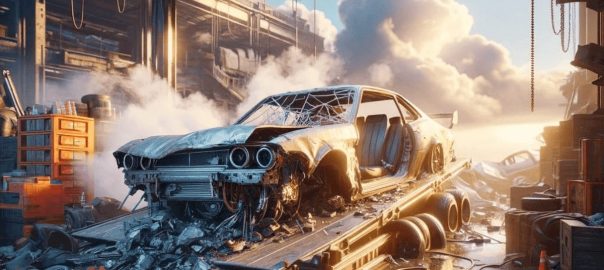When a car becomes irreparably damaged due to accidents, mechanical failures, or abandonment, it’s essential to handle its removal with care and responsibility. Broken car removal is not only about getting rid of an unusable vehicle; it’s also about ensuring that it’s disposed of in a way that minimizes environmental impact and complies with legal regulations.
Reasons for Broken Car Removal
Accidents and Collisions
Car accidents can leave vehicles severely damaged, making them unsafe or impractical to repair. In such cases, removing the broken car becomes necessary for safety reasons.
Mechanical Failures
A car with extensive mechanical issues may not be worth the cost of repairs, leading owners to opt for removal instead. Vehicles with mechanical problems, like problems with the engine or transmission, might become unusable.
Abandonment
Abandoned cars pose various problems, including becoming eyesores, attracting vandalism, and occupying valuable space. Removing abandoned vehicles helps improve the aesthetics and safety of the surrounding area.
Environmental Impact
Pollution from Leaking Fluids
Broken cars frequently leak fluids, including brakes, coolants, and oil, which, if improperly contained and disposed of, can contaminate land and water supplies.
Hazardous Materials in the Car
Cars contain various hazardous materials like lead-acid batteries, mercury switches, and airbags, which must be handled carefully during removal to prevent environmental harm.
Importance of Eco-Friendly Disposal
Proper disposal methods, including recycling and safe disposal of hazardous materials, are crucial for minimizing the environmental impact of broken car removal.
Legal Considerations
Regulations Regarding Car Disposal
Many jurisdictions have regulations governing the disposal of end-of-life vehicles to ensure they are handled safely and responsibly.
Liability Issues
Improper disposal of a broken car can lead to legal liabilities for the owner, especially if it causes environmental damage or endangers public safety.
Importance of Using Licensed Services
Choosing a licensed removal service ensures that the disposal process adheres to legal requirements and environmental standards, mitigating the risk of legal repercussions.
Benefits of Professional Removal Services
Professional removal services offer several advantages over removing a broken car independently.
Convenience for the Owner
Professional removal services handle all aspects of the removal process, saving the owner time and effort.
Proper Handling of Hazardous Materials
Experienced removal professionals know how to safely handle and dispose of hazardous materials found in broken cars, reducing the risk of environmental contamination.
Compliance with Regulations
Licensed removal services are well-versed in relevant regulations and ensure the disposal process complies with legal requirements.
DIY vs. Professional Removal
Risks of DIY Removal
Without expert assistance, removing a broken car yourself can be risky and may even cause legal problems or environmental harm.
Advantages of Hiring Professionals
Professional removal services have the expertise, equipment, and resources to handle broken car removal safely and efficiently.
Cost Comparison
While DIY removal may initially seem cost-effective, the potential risks and liabilities can outweigh any perceived savings.
Steps Involved in Broken Car Removal
Assessment of the Vehicle
The broken car is carefully inspected to ascertain its condition and the best action for disposal before the removal process begins.
Transportation to the Disposal Facility
Once assessed, the car is transported to a licensed disposal facility for end-of-life vehicles.
Dismantling and Recycling Process
At the disposal facility, the car is dismantled, and usable parts are salvaged for resale or recycling. Materials like metal and plastic are recycled, minimizing waste.
Finding a Reliable Removal Service
Researching Local Options
When choosing a removal service, it’s essential to research local options and compare their services, pricing, and reputation.
Reading Reviews and Testimonials
A removal service’s dependability and calibre can be determined by reading client endorsements and reviews.
Checking for Certifications and Licenses
Ensure the removal service is licensed and certified to handle broken car removal, demonstrating their commitment to compliance and professionalism.
FAQs
No, abandoning a broken car on private property is generally illegal and may result in fines or legal action by local authorities.
Selling usable parts from a broken car can be a viable option. However, ensure that any remaining materials are correctly disposed of to avoid environmental harm.
You can verify the removal service’s credentials with the local government or request documentation of their licenses and certificates.
Licensed disposal facilities handle fluids and hazardous materials according to environmental regulations, ensuring proper containment and disposal.
In some cases, expenses related to vehicle disposal may be tax-deductible. Consult with a tax professional for guidance on claiming deductions.
Conclusion
Proper disposal of broken cars is crucial for environmental protection, public safety, and legal compliance. Vehicle owners can ensure that their end-of-life vehicles are handled responsibly and sustainably by opting for professional removal services and prioritizing eco-friendly disposal methods.
